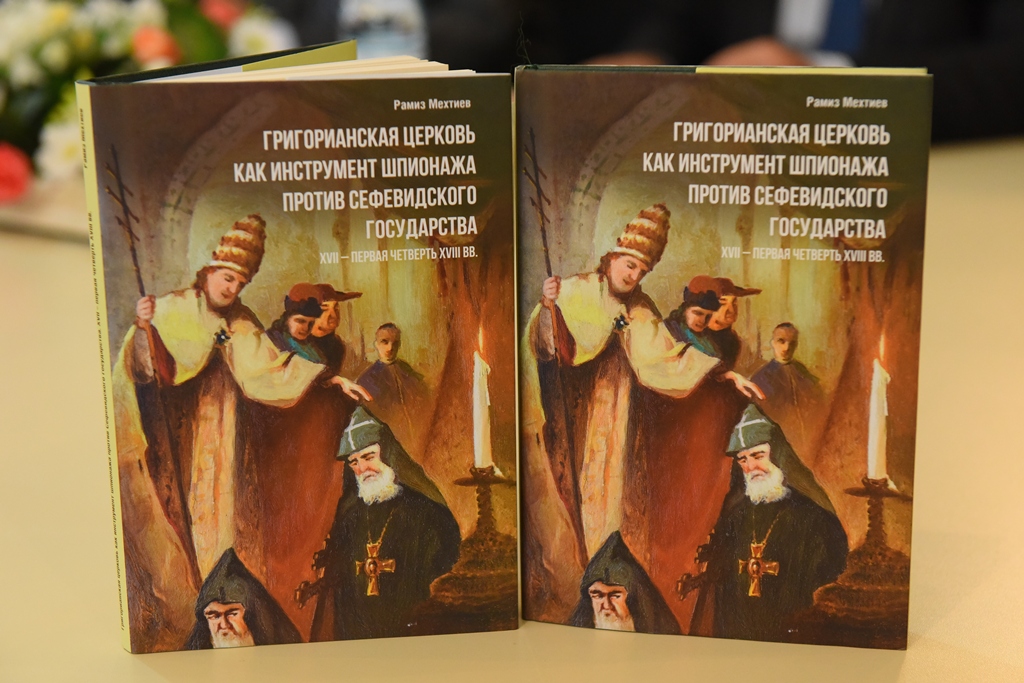Discussion of the book “The Gregorian church as a tool of espionage against the state of Safavids” (the first one-fourth of XVII-XVIII centuries)”


On December 25, 2018, there was held the discussion of the book “The Gregorian church as a tool of espionage against the state of the Safavids” (the first one-fourth of XVII-XVIII centuries)” written in Russian by Academician Ramiz Mehdiyev, head of staff at the Administration of the President of Azerbaijan, at Azerbaijan University of Languages.
The rector of Azerbaijan University of Languages Academician Kamal Abdullayev mentioned the discussion as a serious event in the life of the University. “We have assembled to the discussion of the book “The Gregorian church as a tool of espionage against the state of the Safavids” (the first one-fourth of XVII-XVIII centuries)” written by one of the leading figures of the Azerbaijani science Academician Ramiz Mehdiyev.
Kamal Abdulla said that the book is the logical continuation of the studies conducted by Ramiz Mehdiyev during many years. “If we take these studies in the conceptual form, we can call it the Azerbaijani studies. Mr. Ramiz Mehdiyev has introduced to our society and science in his reflections, thoughts and ideas connected with the history, culture, present and future of Azerbaijan in many of his works. He has dozens of such works and all of them have been devoted to the philosophy of the Azerbaijaniism and statehood”. These books show that the author has deeply comprehended the problems facing the Azerbaijani studies, its philosophy as a sage philosopher, who has used the statehood experience for the protection of the future of Azerbaijan. One of the peculiarities of the formation of Ramiz Mehdiyev as a statesman is his being a close associate of Heydar Aliyev, national leader of Azerbaijan, for dozens of Years. The rector also stressed that as a sagacious philosopher and man Ramiz Mehdiyev has great services in the protection of the statehood of Azerbaijan, he continues his research and philosophical activities today, too.
“His instructions concerning the destiny of the philosophy of Azerbaijan have great methodological importance in the organic inclusion of the philosophy into the system of education and science in Azerbaijan”.
Rector Kamal Abdulla noted that the study of the relations and attitudes of the states around Azerbaijan, of the problems of the Azerbaijani studies were very topical in the past, in XVI century and are topical at present, too. From this point of view the thoughts of Ramiz Mehdiyev concerning the formation of the Armenian state, its religion and society are very interesting and throw light on the Azerbaijani studies. The rector also stressed that the disclosure of the destructive activities of the Gregorian church against the Safavids is very important from scientific, public and statehood points of view are appreciating. He also mentioned that the greatest service of the book is that the young generation will learn the history of Azerbaijan from this book. “They will get acquainted not only of the present-day relations of Azerbaijan and Armenia, but also with those of the past.
Then the collaborators of the Laboratory of the Azerbaijani studies professors Solmaz Rustamova-Tohidi, Niyazi Mehdi, professor of the research laboratory of the Russian Studies Mammad Aliyev, senior research fellow Eldar Amirov, associate-professor of the chair of Regional studies Agil Shahmuradov, associate-professor of the chair of Philosophy and Social Sciences Nadir Guliyev, associate-professor of the chair of the Caucasian Studies Shalala Baghirova, second-year student of the MA Department Sergey Klimov declared that the new research work of Academician Ramiz Mehdiyev has been written on the basis of reliable scientific-historical sources, it has been devoted to an interesting topic, which is important from theoretical, methodological and political point of view. The speakers noted that the said book illuminates widely the subversive, politico-ideological activities of the Gregorian church against the state of Safavids. The book is also of great importance for the investigation of the Armenian-Azerbaijani conflict over the Nagoniy Karabakh Autonomous Region of Azerbaijan. The speakers also mentioned the problem of translation of the book to different languages.









